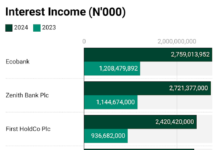There are strong indications that the unstable nature of the naira against the dollar accounts for why cargo import has now dropped by 65 per…
There are strong indications that the unstable nature of the naira against the dollar accounts for why cargo import has now dropped by 65 per cent in the third and fourth quarters of the year.
The naira depreciated to an all-time low on Monday, October 30, trading at about N1,150 to a dollar in the black market.
The downward slide of the naira has also affected the duty imposed on all imports, forcing the very few importers still operating to abandon some of their cargoes at the seaport.
Most clearing agents who expressed their worries said the rise in customs duty would definitely affect the prices of goods in the market during and after the yuletide.
FG moves to facilitate speedy delivery of attack helicopters to NAF
FG, Chinese consortiums sign N365bn contract to upgrade distribution lines
The Tin-Can Island Command of the Nigeria Customs Service, recently highlighted some of the challenges that have led to the downward slide in imports.
This is even as the NCS tightens all areas of revenue leakages to ensure that it surpasses the over N1.3 trillion revenue target for the year 2023.
The comptroller general of the service, Adewale Adeniyi, had said the service will definitely meet up with its revenue projection for the year.
But there are key indicators that have led to the steady decline in imports which include the high exchange rate which has also affected customs duty; and the difficulty in accessing the dollar at the official window, among others.
The dollar fluctuates between N1,150 and N1,200 in the black market as against the Nigeria Foreign Exchange Market (NAFEM) official rate of N848 per dollar.
Investigation by our correspondent shows that most of the berths at the different terminals in both the Apapa and Tin-Can Island ports are becoming vacant as fewer vessels are now making port calls.
Alhaji Ibrahim Tanko, Coordinator of the 100 Percent Compliant Team of the National Association of Government Approved Freight Forwarders (NAGAFF), said over 9,000 vehicles have been abandoned in the ports
He said the vehicles that ought to have been moved to government warehouses are currently taking up space at the terminals.
Dr Kayode Farinto, a former acting president of the Association of Nigerian Licensed Customs Agents (ANLCA), disclosed that import has dropped by 65 per cent and that there is the likelihood that it will drop further before the end of the year.
He said the decline is a direct consequence of the downward slide of the naira, which has also affected customs duty collected on cargo.
A frontline importer, Alhaji Olukolu Tunde Khallil, Chief Executive Officer (CEO) of Khallil Associate Nig Ltd, urged government to try and strengthen the naira.
He said those who were previously importing up to three or four containers before, when the dollar was maybe N400, have now reduced it to one and that even those importing one are now either out of business or coming together as a group to bring in one.
Khallil noted that the federal government as well as some private individuals had in the last eight years invested heavily in agriculture, adding that the current situation would make the investors wind down their operations in Nigeria.
“They will soon start folding up because its owners will not be able to meet up with targets,” he said
The frontline maritime expert said owners of poultry farms are already crying about the exorbitant cost of poultry feed, saying that right now those in the poultry business will start winding down their operations over the escalating cost of poultry feed.
“Countries are going to war to strengthen their currency, we on our own we are doing everything possible to ensure that the naira continues on a downward slide.
“Look at what America is doing to China to keep their economy going. There are a number of items which China can bring into America and there are also a number of items America can export to China.
“It is either our policymakers don’t know what to do. Bringing back the 41 items showed that the government has no business removing it in the first place,” he said.
The renowned freight forwarder noted that the economy of the country will continue on a downward trend if those saddled with the responsibility of making policies do not know or understand the methodology of policymaking as it has to do with the economy of a nation.





















